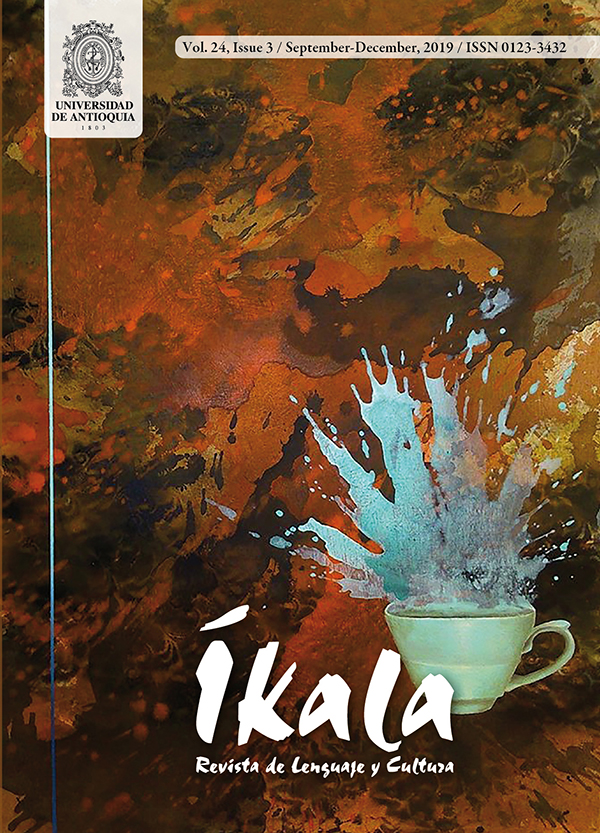Transmediating alphabet book Hoje sinto-me... A comparative reading of two editions
DOI:
https://doi.org/10.17533/udea.ikala.v24n03a05Keywords:
comparative literature, cultural transfers, children’s literature, pic-ture book, Madalena MonizAbstract
Based on the premises that any choice made throughout the process of editorial creation works in tune to deliver meaning (Sipe, 2001), we put forward that two separate editions of a same book can deliver distinct reading experiences. When we compared the publications in Portuguese and English language of Madalena Moniz’ alphabet book Hoje Sinto-me..., analyzed their textual, illustration, and object architecture components, emphasizing on paratextual elements, we came to the conclusion that the first edition favors the aesthetic dimension, while the second one focuses in an educational approach. Beyond editorial choices, variations introduced by the author herself contributed also to create markedly different global perceptions that led us to conclude that even the main character’s personality would have endured changes.
Downloads
References
Moniz, M. (2014). Hoje Sinto-me…. Lisboa: Orfeu Negro.
Moniz, M. (2017). Today I Feel…: An Alphabet of Feelings. Nova Iorque: Abrams Appleseed.
Bibliografia passiva
Beckett, S. L. (2009). Crossover Fiction. Global and Historical Perspectives. Nova Iorque: Routledge.
——— (2012). Crossover Picturebooks. A Genre for All Ages. Nova Iorque: Routledge.
Bosch, E. (2007). Hacia una Definición de Livro-álbum. Anuario de Investigación en Literatura Infantil y Juvenil, 5, 25–45.
Mota, C. (2016). Viagem Exploratória pela Atual Literatura Infantil. Porto: Tropelias & Companhia.
Nikolajeva, M. (2008). Play and Playfulness in Postmodern Picturebooks. In L. Sipe, & S. Pantaleo (org.), Postmodern Picturebooks: Play, Parody, and Self-Referentiality (pp. 55–74). Oxon e Nova Iorque: Routledge.
Nodelman, P. (1988). Words About Pictures. The Narrative Art of Children’s Picture Books. Athens, GA: University of Georgia Press.
Ramos, A. M. (2007). Livros de Palmo e Meio. Reflexões sobre Literatura para a Infância. Lisboa: Editorial Caminho.
——— (2011). Apontamentos para uma poética do álbum contemporâneo. In B.-A. Roig Rechou, I. Soto Lopéz, & M. Neira Rodríguez (org.), O Álbum na Literatura Infantil e Xuvenil (2000–2010) (pp. 13–40). Pontevedra: Edicións Xerais de Galicia.
——— (2012). Tendências Contemporâneas da Literatura Portuguesa para a Infância e Juventude. Porto: Tropelias & Companhia.
Salisbury, M., & Styles, M. (2012). Children’s Picturebook: The Art of Visual Storytelling. Londres: Laurence King Publishing.
Silva, S. R. da, & Martins, D. M. (2016). Con Letras Se Hacen Palabras: Contribuciones Para Una Caracterización Del Libro-abecedario Para La Infancia. Elos. Revista de Literatura Infantil e Xuvenil, n.º 3, 143–165.
Sipe, L. R. (1998). Learning the language of picturebooks. Journal of Children's Literature, n.º 24, 66–75.
——— (2001). Picturebooks as Aesthetic Objects. Literacy Teaching and Learning: An International Journal of Early Reading and Writing, Volume 6, n.º 1, 23–42.
Sipe, L. R., & McGuire, C. E. (2006). Picturebook Endpapers: Resources for Literary and Aesthetic Interpretation. Children's Literature in Education, Volume 37, n.º 4, december, 291–304.
Published
How to Cite
Issue
Section
License
Copyright (c) 2019 Íkala

This work is licensed under a Creative Commons Attribution-NonCommercial-ShareAlike 4.0 International License.












